I’ve been getting my hands dirty in the garden recently and pondering the overlap between two of the activities I love – gardening and writing – although I think the analogies are true for creativity generally. This ties in well with this year’s blog theme of what we can learn about creativity from the world around us.
So what can we learn about creativity from gardening?
(with pix from our garden – a labour of love!)
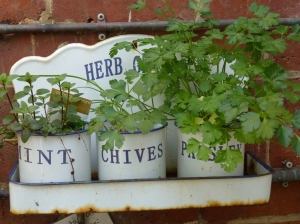 Herbs © 2014 Jacquie Garton-Smith
Herbs © 2014 Jacquie Garton-Smith
-
Timing is important
You must do what needs to be done when the time is right. In Big Magic, Elizabeth Gilbert writes eloquently about creative ideas passing if you don’t take them up. No point sowing your seeds in the wrong season, although you needn’t lie idle either …
-
Prepare your ground
Gardeners won’t need to be convinced of the benefits of fertile soil and a fertile mind is a great start for creatives (for some ideas, see Learning from the creative inspiration around us)
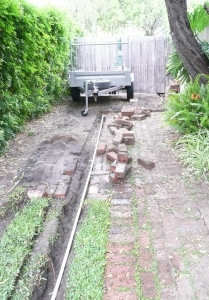 Retic going in © 2013 Jacquie Garton-Smith
Retic going in © 2013 Jacquie Garton-Smith
-
Prepare your plot
I’m not saying you must strictly plot your story, although that works for some. What we do need to do is set up a supportive environment – where the gardener may set up a sprinkler system, a raised garden bed, supports for creepers or fence off an area, so a creative must establish what’s needed to support their creative work and put it into place.
-
Plant your seeds
If you don’t get your seeds in the soil, they won’t grow. What we plant is nothing like what we end up with – and so it is for us creatives. Just start with your idea and see what grows. If your ideas come to you at inconvenient times, make a note of them so you have them for when the season is right. If procrastination is your problem, The power of naming procrastination may help.
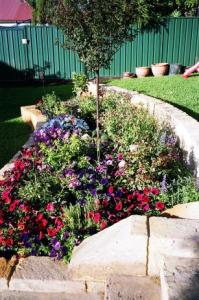 Plumtree terrace viewed lengthwise © 2004 Jacquie Garton-Smith
Plumtree terrace viewed lengthwise © 2004 Jacquie Garton-Smith
-
Nourish your seedlings
As our plants need regular water and periodic fertiliser (some more than others!), so our creative ideas need encouragement. And too much love can have its issues – much as overwatering or over-fertilising is unwise, try not to overwrite, overpaint or over-torture your creative idea. Just get it out and let it grow.
-
Protect new growth
Those precious shoots do need protection from all kinds of insults. Where our shrubs may need protection from pests and diseases, heat and drought, frost, wind and storms, animal attack, so sometimes we need to protect our fledgling creative work from self-doubt and wrong turns, mistakes (they are okay – they can take you in new directions), the opinions of others (this can be particularly destructive on early work which, let’s face it, will always need to evolve) and withering enthusiasm, interruptions and excuses. If finding the time to be creative is a challenge, check out When push comes to shove – juggling priorities in a time-poor world.
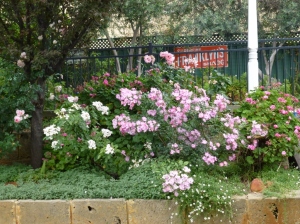 Plumtree terrace ten years later (front on) © 2014 Jacquie Garton-Smith
Plumtree terrace ten years later (front on) © 2014 Jacquie Garton-Smith
-
Train into the direction or shape you want
Many plants benefit from encouragement in the right direction. I’ve been known to laboriously and repeatedly twist creeper shoots around supporting structures or fences and to hang part-filled bottles to tree branches to train them where I want them to go. I commissioned several garden designers to draw up plans for our garden, none of whom could see their way around the easiest and cheapest way to what I wanted, before one encouraged to me to design it myself (and gave me great advice which helped us achieve it and more). We creatives do need to be open to the journey our creative work wants to take us on and there are times we need to take charge of our project and direct it where we want it to go. You’ll know when you have the vision you need to do this.
-
Fear not a good pruning
It took me a long time to learn to prune with confidence in the garden and (surprise, surprise) also in editing. If unsure, start gently, review and then trim a bit more, and repeat again and again until done. Luckily in writing and many other creative pursuits, the benefits of a healthy prune can usually be seen instantly in your shining work where in the garden, it can look seriously brutal until the plant reshoots. But it must be done for a better result.
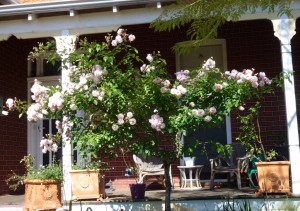 Cornelia Weeping Rose © 2014 Jacquie Garton-Smith
Cornelia Weeping Rose © 2014 Jacquie Garton-Smith
-
Try new things
I do like a fairly traditional garden which goes very well with our 1914 home, but trying new things can be great fun in the garden, be it new varieties, different combinations or new techniques. I’m a sucker for new varieties of plants. Some work, some don’t but that’s part of the fun. New combinations of plants can really freshen up a garden bed. And I like to keep abreast of new approaches to gardening. Worm farming was very new when I started and has been a fabulous addition to our garden, reducing our use of conventional fertilisers to nearly nothing and using up most of our kitchen waste to boot. What does all of this have to do with creativity? Try weaving some new and different approaches into your creative project and see if they sing. If they don’t, see 8 …
-
Fads come and go but the basics never fail you
The “right way” of doing things is often the best. Whether it’s the basic gardening skills or techniques, solid equipment or the old favourite plants, they will carry your garden to achieve its full potential whatever the trends. As will good artistic/musical/dance/writing/culinary/(insert your creative passion here) techniques, materials and equipment. And you don’t necessarily need to spend a fortune or study at university to develop these.
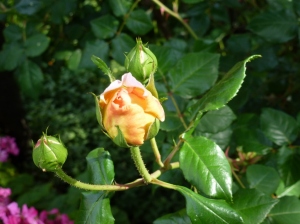 Rosebuds © 2014 Jacquie Garton-Smith
Rosebuds © 2014 Jacquie Garton-Smith
-
Celebrate every beautiful moment
Yes, that empty plot that’s been dug over, soil built up with seeds planted and watered in may not look like your dream garden but it’s a huge achievement in itself. Same with that early painting, sketch or tune, or draft storyline or scene. Enjoy every stage of the process. You deserve it.
-
Know when to yank out your plant (or even the whole garden bed) and start afresh
It can be heartbreaking but also liberating – why struggle on with something that is not going to deliver or is past its use-by. You do need to be sure it’s not that periodic falling in and out of love with our creative work that naturally happens, but when the time comes to free yourself up for something better, celebrate that stage too.
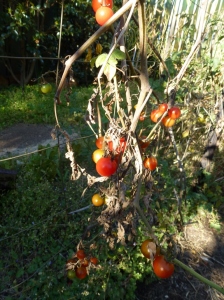
Cherry Tomatoes finishing © 2014 Jacquie Garton-Smith
-
Lying fallow
Paddocks benefit from fallow periods – do we? I think so and I’ve written about my experience with this in Is it a dreadful mistake to take a break from writing?
I’m sure the list could go on …
Do you have any gardening/creativity analogies to add?
Have you found one or more to be particularly useful?
Please feel free to comment below.
With best wishes for your creative health and that of our community.
Jacquie
P.S. If you’d like to be sure to catch my next post, please sign up to follow by email (your email address will be kept private and will not be spammed). You can also follow me on Twitter (@JacquieGS) and Facebook.
© 2016 Jacquie Garton-Smith (text and all images)
Hi Jacquie,
I love this post and can totally relate. It’s reassuring to hear that other more experienced writers struggle with the same sorts of issues. I think my biggest struggle is knowing when to keep nourishing a project and when to be brutal and rip it out by its roots! As I gradually gain experience, I’ve learnt to keep at things longer, accept the horror of first drafts, and remind myself that no writing is a waste.
I do have a gardening analogy of sorts … a bit crass but it talks about manure! https://fionahrobertson.com/2016/02/21/redemption/
Thank you for sharing your wisdom & happy writing to you!
Hi Fiona
Thanks so much for your comment and for the link to your delightful post – love the “bag of excrement” story and the fact you garnered something useful from it.
I have to agree that ripping out and replanting a garden is much less challenging and more immediately satisfying than uprooting a creative project, but you are so right that no writing is a waste – even if that story goes nowhere, something has evolved in our creative journey.
Happy writing to you too!
Jacquie
Very nice analogy. I’m about to rip out my old herb garden. It’s just time to start it over and I will bear in mind what you have so aptly pointed out. I think I’ve experienced every one of these creative situations. My two favourites are lying ‘fallow’ which I call recharging my batteries; and the other is to try something new or go back to a favourite ‘old’ thing that I haven’t done in a while. Either one is likely to break me out of a creative slump and fuel new endeavors. Thank you.
Many thanks – great to know what works for you and the idea of going back to an old favourite is a wonderful suggestion, and something I have also found valuable without realising it.
Have fun with your herb garden overhaul – I bet those new shoots will be much more flavoursome than the tired old plants!
Thanks for the reminders, Jacquie. Reminds me, too, about how much gardening itself sparks ideas and solves creative problems as I dig and weed and plant. Lately, I’ve been viewing my garden as a huge task that needs to be tackled instead of seeing it as an opportunity to think and create.
Thanks so much – I hope they help, Melinda!
Funny how the garden can seem daunting and yet when you get into it, it is very therapeutic and great time to organically ponder on other creative projects.
Good luck!
Jacquie
Just this:
1. I learned a new word: “retic.” When I googled it in relation to gardening, all the websites that talked about it had .au domains, so it must be an Aussie thing!
2. I’m envious of your roses, and quite sure that you don’t have the black spot problems that I have in Seattle.
3. I think maybe if I start thinking of editing as pruning, it will seem more appealing. Plus, less thorns to deal with, maybe…
Great to hear from you Laura!
Apologies for the ‘retic’ reference – I didn’t realise this was an Australianism – short for reticulation which is much needed in a large garden in Western Australia, We have sprinkler restrictions due to water shortages but with a bore we can use the reticulation up to three days a week on set days during limited times.
The dry weather does have its challenges but on the upside does somewhat help avoid blackspot! One thing I have rarely had to treat.
I have to keep reminding myself that cutting back will bring out the true beauty – I’ve got in the habit of noting my word count at the start of each editing session – perhaps the tangible equivalent of pruning to see the number dropping steadily (even if I add bits here and there) because you don’t fully appreciate that the text is shining more until you finish and reread it with fresh eyes.
Many thanks
Jacquie
Hi Jacquie, I love the post and the relations to creativity. I have read while sipping on a Turmeric Latte, and brushing my hands across the potted basil that I haven’t planted yet x
Thanks Rae – I have the ingredients for your Turmeric Latte on today’s shopping list and can’t wait to try one!
I love the smell of fresh basil – and isn’t it wonderful to be able to harvest your own fresh herbs for cooking? As an aside, I overheard a garden shop staff member telling another customer that basil does better in pots to keep them warmer over winter here, so maybe it’s in the right spot for now? (I have no idea if it’s true but sounded plausible!)
Enjoy your spicy and herby aromas and thanks again.
Jacquie
Loved the gardening analogy for writing! I can see the similarities, and I can also see see how gardening and writing could work synergistically—gardening seems so replenishing for the creative mind. This post has made me want to garden more—except for the two canines who pull it all apart!
Ah Louise, I hear you! Our canines have wrought much botanical and reticulation destruction over the years – our two are now nine years old and nearly ten so are a tad more sensible … most of the time! We have designed the garden with their needs in mind though, including a dog run around the terraced beds and a sand pit they can dig in, and have areas they can’t access when they are home alone.
One thing they revel in is having one or more of their humans outside with them – just love those smiling dog faces keeping me company while I garden. And the best bit is they don’t yabber so I can think about my writing still!
From what I’ve seen, I reckon you could turn your hand to just about anything and you clearly have a connection with nature from your photography – your stunning shots put my snaps to shame. I adore seeing your lovely images pop up on a regular basis on your blog and social media and these also inspire me.
Good luck with whatever you decide to do on the gardening front!
Jacquie
Lovely post, Jacquie. l need to apply Lessons 12 and 9 to both my writing and little patio garden. Certain plants have not lived up their promise – much like a few scenes and chapters that have been lying fallow. They need to be to be yanked out and replaced with something new. Time to roll out of the hammock and get my hands dirty again.
Yay Helena! Exciting to have a creative garden project in the planning
And I managed to hit send before I had finished – must be all that excitement! So far I have hardly seen a word of yours that I would cut, let alone a scene, though when you bring them all together for the final cut it may well be true. Looking forward to finding out about the results of both your gardening and your next lot of writing. Lovely to hear from you x
Hi Jacquie, I love the post and the relations to creativity. I have two big gardens so far. There, I plant many kinds of vegetables and small flower plants. It’s a very good article when I get this as a gardening writing form. After this article, I can know and learn a lot about Gardening. Thank you for sharing such an effective post.
Thank you, Vicki! Lovely of you to comment. I’m glad you enjoyed the post. Best wishes, Jacquie